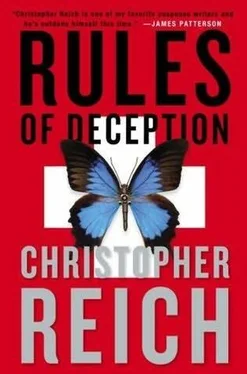Disillusioned, he heard only silence.
Marcus von Daniken tossed a dossier onto the desk. “Not exactly the manpower I was hoping for,” he said. “But you’ll do.”
He looked at the four men seated around the table. None had slept a wink in the last thirty-six hours. A welter of empty coffee mugs attested to their hypercaffeinated state. The glaring overhead lights didn’t help much either.
To his usual crew of Myer, Krajcek, and Seiler, he’d added Klaus Hardenberg, an investigator from the financial crimes division. After a few minutes of bantering, they’d decided to call themselves a task force, in spite of their limited numbers. It would make it easier to explain the long hours to their wives, even if they were forbidden from discussing the focus of their work.
Von Daniken didn’t bother to flatter them that they were the best men in his department.
“Let’s start with questions,” he said, sliding into a chair. “Anything that’s bothering you, let’s hear it.”
The voices came at him fast and furious. Who did he think killed Lammers? What was the connection between him and Blitz/Quitab? If Quitab was an Iranian officer, shouldn’t they forward his name to all friendly agencies to check for any background information? Had any evidence beyond the terrorist’s confession been found linking Walid Gassan with Blitz/Quitab and Lammers? Did they have any idea of Gassan’s activities during his passage through Switzerland a month earlier? Which airport was the most likely target? And what about the American, Ransom? Where did he fit in? What should they make of his killing the two police officers in Landquart? Might he have had time to kill Lammers the same day his wife died?
Finally, there was a question posed in various forms by all the men present: Why did Marti have his head stuck so far up his ass?
Von Daniken was unable to answer any of the questions, and his ignorance highlighted the fault that ran through the center of the investigation. Essentially, they knew nothing about the conspirators or the plot.
It came down to one thing: there was too much to do and too little time to do it.
Von Daniken divided the inquiries into four areas. Finance. Communications. Field investigation. And transportation. He would take finance. His experience as a member of the Holocaust Commission had left him with a raft of acquaintances and contacts, as well as a few friends in the banking establishment.
“We’ll start with the Villa Principessa,” he said. “That’s no squatter’s hovel in Hamburg. It takes real money to set up digs there.”
It would be his job to find out who had leased it, for how long, and where the payments had come from. The key would be to discover where Blitz did his banking. Of all the threads, this one carried the potential for the greatest yield. Once it was discovered where he conducted his daily business, von Daniken could backtrack and trace the origin of funds transferred into the account. As importantly, he could see where monies were channeled afterward. In one direction the money trail would lead to Blitz’s paymasters-the organization or government underwriting his adventures. In the other, it would lead to his co-conspirators.
Klaus Hardenberg would cover the second line of inquiry, focusing on credit. Von Daniken said he wanted all records for Blitz, Lammers, and Ransom over the past twelve months. Tracking their expenditures would yield invaluable information about their daily activities and provide a road map as to their whereabouts during the past twelve months.
Lammers would be the easiest of the three. Five charge cards had been found in his wallet. In order to avoid deportation, his wife was cooperating with their inquiries.
Blitz was another story. No wallet or identification had been found in his home. However, by a stroke of luck, one page of his December Eurocard statement had slipped beneath the credenza in his home office. The charge card would yield a credit history, along with banking references and some form of national identification number.
The jury was still out on Ransom. Immigration had only just come back with his details. As of this moment, Ransom’s passport number and Social Security number were being run through Interpol and forwarded to the Federal Bureau of Investigation’s National Crime Information Center.
Kurt Myer was in charge of communications. He’d begun work upon returning from Ascona. “Swisscom is sending over a list of all calls made from Blitz’s home in the last six months,” he reported. “We’ve already got Lammers’s list for the same period. First, we’ll cross the two and see if they have any friends in common. Then we’ll go back a level and take a look at all calls made to and from their correspondents. We should have the first reports by seven in the morning.”
“Good,” said von Daniken. Five years earlier, he’d been instrumental in passing into law a requirement that telecommunications companies keep a six-month call log for every registered number. “After you run the two lists, isolate all cellular numbers and see if we can find some similar names. If they’re using SIM cards, trace the numbers back to their point of sale.”
“I can guarantee we’ll find some similar names,” said Myer. “It’s just a question of how careful they were. Everybody makes mistakes.”
“Let’s keep our fingers crossed that they’re not registered to foreign telecoms,” said von Daniken.
Krajcek rolled his eyes. “Pray not the Germans.”
No one protected their citizens’ privacy more ferociously than the Federal Republic of Germany.
Finance and communication worked collaboratively. Once von Daniken’s inquiries into the suspects’ finances began to pay off, all related phone numbers would be passed along to Myer. Each and every hit would be fed into a predictive software program that used the data to map a “web of relationships” neatly illustrating Blitz’s and Lammers’s socioeconomic lives.
Von Daniken grabbed a cup of espresso in the break area-two sugars, twist of lemon-and downed it in two swallows. It was ten p.m. and he’d been awake for thirty-eight hours. His fatigue, however, had been replaced with a quiet optimism. In the beginning, everything was possible.
He looked at the empty coffee cup. Then again, maybe it was the caffeine boosting his spirits.
He slapped his hand on the desk to get their attention. “Mr. Krajcek will be visiting with our field agents in Geneva, Basel, and Zurich tomorrow, won’t you?”
“First thing.”
For the past three years, the Service for Analysis and Prevention had been running agents inside the country’s most important mosques. Most were volunteers, Muslims angered by the way their religion had been hijacked by fundamentalists. Others were more reluctant and had to be pressed into service by threats of deportation to their home country. The take had yielded critical intelligence about smuggled RPGs, AK-47’s, and a network of hawala-or money transfer-agents used by an Algerian terror cell operating out of France, Switzerland, and northern Italy.
“Concentrate on finding someone who visited with Gassan during his recent transit through Geneva,” von Daniken said. “I want contacts, places visited, where he holed up, and any mentions of his intent.”
All this Krajcek wrote furiously in his notepad.
Von Daniken turned to the next in line. “And now, Mr. Hardenberg…”
Hardenberg tried to smile, but succeeded only in looking like he was passing a kidney stone. He was fat, middle-aged, and pudding-faced with heavy tortoiseshell glasses that shielded shy brown eyes and a head as bald as an ice cube. And he was, bar none, the meanest, most dogged investigator von Daniken had ever come across. His nickname was the “Rottweiler.”
Читать дальше












